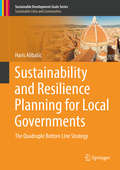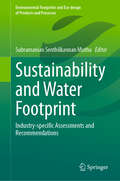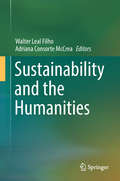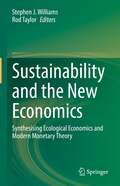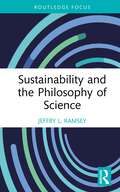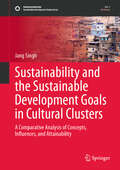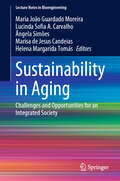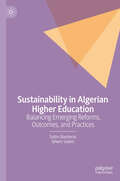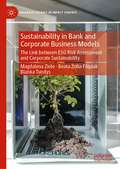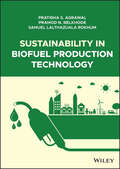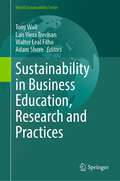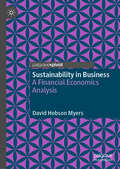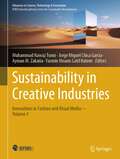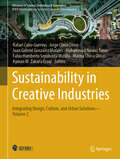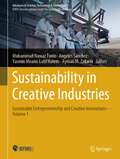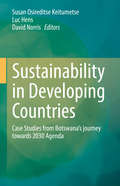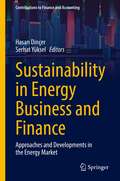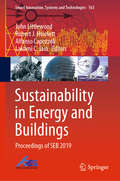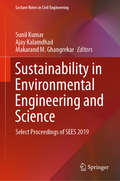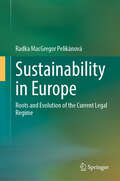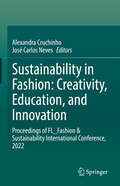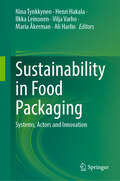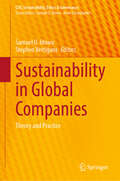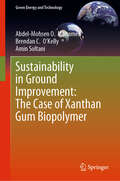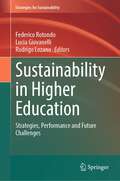- Table View
- List View
Sustainability and Resilience Planning for Local Governments: The Quadruple Bottom Line Strategy (Sustainable Development Goals Series)
by Haris AlibašićThis book details a process of creating a long-term sustainability and resilience plan for local governments to use in designing and implementing sustainability and resilience-related policies, initiatives, and programs. It offers guidance and methods in applying sustainability and resilience strategies to attain the prosperity of organizations and communities. The recommendations in this book are based on the author's years of experience in directing applied resilience and sustainability planning for a local government, and years of research covering diverse aspects of sustainability and resilience from climate change, climate preparedness and readiness, quadruple bottom line strategy, greenhouse gas emission reduction policies, climate adaptation and mitigation to sustainable energy policies and initiatives. Chapter one defines terms related to sustainability and resilience and addresses how the topics reshape local governments and communities. Chapter two maps out the sustainability and resilience process for organizations and communities, determining the appropriate steps to be taken at each level of sustainability and resilience planning. Chapter three identifies community and organizational level engagement, with internal and external stakeholders, including designs necessary throughout these processes. Chapter four contains measuring, tracking, monitoring and reporting methods using the quadruple bottom line strategy, and developing a sustainability and resilience progress report to ensure accountability, transparency, and good governance. Then, chapter five details the implementation of a sustainability and resilience plan once it is established, describing potential programs and initiatives to achieve sustainable and resilient communities. Chapter six describes the intersection between sustainability and resilience, and chapter seven examines the tools and resources available to create a practical sustainability and resilience plan. Chapter eight concludes the text by addressing the future of sustainability and resilience, and complexities of the modern dynamics of the interconnected systems in cities, counties, and organizations, and recommends how local government administrators in their planning methods and strategies must consider these challenges.
Sustainability and Water Footprint: Industry-specific Assessments and Recommendations (Environmental Footprints and Eco-design of Products and Processes)
by Subramanian Senthilkannan MuthuThis volume offers background and a variety of cases dealing with the concept of water footprint. The first chapter provides an introduction to the concept of water footprint and how it can be used to evaluate efforts toward sustainability, conservation, and environmental cleanup and remediation. Special focus is given to wastewater treatment from housing and construction, agriculture, and other industries. This book will be useful to academics, professionals, and students who are striving to make industrial use of water and cleanup of byproducts more sustainable.
Sustainability and the Humanities
by Walter Leal Filho Adriana Consorte McCreaThis book explores the strong links between sustainability and the humanities, which go beyond the inclusion of social sciences in discussions on sustainability, and offers a holistic discussion on the intellectual and moral aspects of sustainable development. The contributions from researchers in the fields of education, social sciences, religion, humanities, and sustainable development fulfill three main aims:They provide university lecturers interested in humanities and sustainable development with an opportunity to present their work;foster the exchange of information, ideas and experiences acquired in the execution of teaching and research; anddiscuss methodological approaches and projects that provide a better understanding of how the humanities can contribute to the debate on sustainable development. Prepared by the Inter-University Sustainable Development Research Programme and the World Sustainable Development Research and Transfer Centre, the book reiterates the need to promote integrated approaches to sustainable development. Including practice-based lessons learnt that can be replicated further, it is a valuable resource for scientists and practitioners working in the humanities and sustainable development.
Sustainability and the New Economics: Synthesising Ecological Economics and Modern Monetary Theory
by Rod Taylor Stephen J. WilliamsThis multidisciplinary book provides new insights and hope for sustainable prosperity given recent developments in economics – but only if swift and strong actions consistent with Earth’s biophysical limits and principles of justice are universally taken. It is one thing to put limits on resource throughput and waste generation to conform with the ecosphere’s biocapacity. It is another thing to efficiently allocate a sustainable rate of resource throughput and ensure it is equitably distributed in the form of final goods and services. While the separate but interdependent decisions regarding throughput, distribution, and allocation are the essence of ecological economics, dealing with them in a world that needs to cure its growth addiction requires a realistic understanding of macroeconomics and the fiscal capacity of currency-issuing central governments. Sustainable prosperity demands that we harness this understanding to carefully regulate the rate of resource throughput and manipulate macroeconomic outcomes to facilitate human flourishing. The book begins by outlining humanity’s current predicament of gross ecological overshoot and laments the half-century of missed opportunities since The Limits to Growth (1972). What was once economic growth has become, in many high-income countries, uneconomic growth (additional costs exceeding additional benefits), which is no longer advancing wellbeing. Meanwhile, low-income nations need a dose of efficient and equitable growth to escape poverty while protecting their environments and the global commons. The book argues for a synthesis of our increasing knowledge of the ecosphere’s limited carrying capacity and the power of governments to harness, transform, and distribute resources for the common good. Central to this synthesis must be a correct understanding of the difference between financial constraints and real resource constraints. While the latter apply to everyone, the former do not apply to currency-issuing central governments, which have much more capacity for corrective action than mainstream thinking perceives. The book joins the growing chorus of authoritative voices calling for a complete overhaul of the dominant economic system. We conclude with policy recommendations based on a new economics that, if implemented, would come close to guaranteeing a sustainable and prosperous future. Upon reading this book, at least one thing should be crystal clear: business as usual is not a viable option.
Sustainability and the Philosophy of Science (Routledge Focus on Environment and Sustainability)
by Jeffry L. RamseyThis book demonstrates how the philosophy of science can enhance our understanding of sustainability and the practices we use to enact it. Examining assumptions about concepts, theories, evidence, and the moral ideals of sustainability can better orient us as we pursue this urgent and important goal. The book applies perspectives and tools from the philosophy of science – construed broadly to include portions of science and technology studies, history of science, and philosophy more generally – to sustainability discourse. It argues that widely held assumptions regarding the meaning of concepts, methods of theorizing and inferential practice, evidential structure, and ethics limit our understanding and practice of sustainability. It offers philosophical alternatives that capture more fully the confusing, wicked nature of sustainability challenges. The alternatives draw attention to existing but often undervalued frameworks in sustainability discourse. This book is aimed towards academics, researchers, and post-graduates working in sustainability, as well as philosophers of science and environmental philosophers interested in the philosophical issues raised by the pursuit of sustainability.
Sustainability and the Sustainable Development Goals in Cultural Clusters: A Comparative Analysis of Concepts, Influences, and Attainability (Sustainable Development Goals Series)
by Jang SinghThis book examines the three pillars of sustainability (physical environment, social issues, and economic justice) and the progress and achievability of the United Nations’ (UN) 17 Sustainable Development Goals (SDGs) in Canada, Guyana, India, Sri Lanka, and the USA. It presents data from interviews with 41 political and business leaders in these five countries to examine the political and professional effects on sustainability. In addition to the three pillars of sustainability, the author briefly examines the role of religion in sustainability as a potential fourth pillar. The UN SDGs represent minimum targets for the global environmental, economic, and social pillars that underpin a sustainable future for our planet. The data presented in this book combined with the themes uncovered with the SDGs adds to our understanding of how we can potentially influence and achieve these targets and create a sustainable future for the world.
Sustainability in Aging: Challenges and Opportunities for an Integrated Society (Lecture Notes in Bioengineering)
by Maria João Guardado Moreira Lucinda Sofia A. Carvalho Ângela Simões Marisa de Jesus Candeias Helena Margarida TomásThis book offers multidisciplinary perspective on the dynamic process of aging proposing strategies for developing more functional ageing societies. Gathering revised and expanded papers presented at the 3rd Congress of the Interdisciplinary Research Unit &“On Building Functional Ageing Communities&” , organized by the Polytechnic Institute of Castelo Branco, this book addresses the multidimensional aspects of sustainability in aging, exploring the environmental, health, social, economic, political, and cultural dimensions. Each chapter presents new perspectives that should help to understand the phenomenon of population aging in the context of sustainability and contribute to the promotion of Active and Healthy Aging that is also Sustainable. This book is aimed at a wide range of professionals concerned with aging and sustainability and the and the development of more sustainable and functional societies.
Sustainability in Algerian Higher Education: Balancing Emerging Reforms, Outcomes, and Practices
by Salim Bouherar Sihem SalemThis volume provides a comprehensive overview of the current state of sustainability in Algerian higher education. It examines the policies, initiatives, and practices that have been implemented across universities and other educational institutions, while also identifying the gaps and opportunities that remain. Through case studies, interviews, and analyses, the authors explore how these institutions are working to align their missions with the broader goals of sustainable development, and how they are contributing to the national and global discourse on sustainability.
Sustainability in Bank and Corporate Business Models: The Link between ESG Risk Assessment and Corporate Sustainability (Palgrave Studies in Impact Finance)
by Magdalena Ziolo Blanka Tundys Beata Zofia FilipiakThe book explains the impact of bank business models on company business models by discussing the relationship among banks decision-making processes, sustainable values creation in company business models, and ESG risk. The monograph provides a combination of financial and management-related activities, in the context of bank business models, taking into account the concept of sustainability, and will be of particular interest to both in-house practitioners, giving them innovative knowledge about the models presented and used, and to students and young researchers.
Sustainability in Biofuel Production Technology
by Samuel Lalthazuala Rokhum Pratibha S. Agrawal Pramod N. BelkhodeSustainability in Biofuel Production Technology Explore current challenges and the latest technologies in biofuel production In Sustainability in Biofuel Production Technology, a team of engineers and chemists delivers a thorough and accessible exploration of the source of renewable energy biofuels poised to help conserve natural resources and limit the impact of fossil fuel use. The book offers detailed information about the challenges and trends in biodiesel production and includes contributions from leading researchers in the field of biodiesel production. Readers will explore aviation biofuels, biofuel production technologies, reactor design and safety considerations, and the modelling and simulation of biofuel production as they move through the book’s 14 chapters. The authors also analyze the performance of biofuels along with cost estimations and mathematical modeling of various process parameters. Readers will also find: A thorough introduction to biofuels, including their history, generation, classification, and relevant technologies In-depth presentations of the production technologies of biofuels, including chemical and biological production processes Comprehensive explorations of the utilization of biofuels in aviation, including performance analyses and safety considerations Fulsome discussions of key issues and challenges in biofuels production pathways and the environmental effects of biofuels Perfect for academic researchers and industrial scientists working in the biofuels, bioenergy, catalysis, and materials science sectors, Sustainability in Biofuel Production Technology will also be suitable for members of regulatory bodies in the bioenergy sector.
Sustainability in Business Education, Research and Practices (World Sustainability Series)
by Walter Leal Filho Tony Wall Laís Viera Trevisan Adam ShoreThe connections between sustainability and business education are becoming increasingly important due to the growing recognition of environmental and social challenges, as well as the role that businesses play in addressing these challenges. Businesses have a significant impact on the environment, society, and the economy. Issues such as climate change, resource depletion, social inequality, and ethical concerns directly affect business operations and performance. Business education needs to equip future leaders with the knowledge and skills to navigate these challenges responsibly. This book provides a platform for the dissemination of information on the latest initiatives and practices in these areas, and promotes future cooperation between universities and business schools across the globe.
Sustainability in Business: A Financial Economics Analysis
by David Hobson MyersThis book provides an approach to sustainable decision-making rooted in financial and economic literature. Financial economic techniques have the power to frame the discussion of sustainability to explain who, how, and why sustainability is a growing phenomenon in business and investing. Financial concepts in a sustainable framework provide a theoretical basis to approach research and business questions on sustainability. The framework provides for a better understanding of the different definitions of sustainability and the role those differences have on decisions that will lead to the future of sustainable business. A future which relies on growth driven by expanding its markets’ reach (demographics), its innovation or creation of new products, and its capital structure (leverage). Third party certification and governmental regulation become the constraints on that growth as well as the proof of sustainable growth. Finally, the ability and methods for investors to support sustainable growth is addressed in a modern portfolio theory analysis.
Sustainability in Creative Industries: Innovations in Fashion and Visual Media—Volume 3 (Advances in Science, Technology & Innovation)
by Muhammad Nawaz Tunio Yasmin Moanis Latif Hatem Ayman M. Zakaria Jorge Miguel Chica GarciaIn this volume, sustainable creative industries become a beacon for innovative change, forging a path towards a conscious, harmonious world. This volume offers a panoramic view of the future, where innovations in fashion and visual media blend seamlessly with a commitment to a more sustainable and impactful world. More specifically, this volume explores the compelling interplay of sustainability, creativity, and advocacy, casting a spotlight on the transformative potential within fashion and visual media. It embarks on a journey through the innovative landscapes of fashion, where sustainability takes center stage, through an exploration of genderless mode development, contemporary patterns, and reimagined design strategies that breathe new life into tradition. As readers explore the chapters within, the symbiotic relationship between visual media and sustainability emerges, further delve into the evolution of visual communication design and the potency of Instagram microblogs in shaping perceptions and awareness. Furthermore, the role of design in disseminating critical information during disasters is unveiled and the ways in which narrative methods can ignite meaningful change explored.
Sustainability in Creative Industries: Integrating Design, Culture, and Urban Solutions—Volume 2 (Advances in Science, Technology & Innovation)
by Muhammad Nawaz Tunio Jorge Chica-Olmo Rafael Cano-Guervos Juan Gabriel González Morales Fabio Humberto Sepúlveda Murillo Marina Checa Olivas Ayman M. Zakaria EraqiThis book discusses the dynamic interplay of creativity and sustainability in the realm of design, offering a captivating exploration of innovative practices and their environmental impact. From biomimetic inspirations to biophilic designs, it unveils a spectrum of ideas in sustainable architecture. It further dives into inclusive and creative designs, social sustainability for the elderly amid the pandemic. This book casts a spotlight on the intricate synergy between preserving cultural heritage and fostering creative industries. It explores the profound significance of architectural lighting, the innovative reinterpretation of traditional motifs, and the enduring allure of heritage design within its chapters, creating an engaging and thought-provoking journey. Moreover, it ventures into the Integration of Creative Design in Urban Planning, presenting a futuristic outlook that seamlessly blends technology, sustainability, and human-centric solutions. Designed for a wide audience, including professionals, educators, and students, this book is a compelling resource for those passionate about the intersection of creativity and sustainability. It offers thought-provoking ideas, informative case studies, and a glimpse into the future of design that transcends boundaries.
Sustainability in Creative Industries: Sustainable Entrepreneurship and Creative Innovations—Volume 1 (Advances in Science, Technology & Innovation)
by Muhammad Nawaz Tunio Angeles Sánchez Yasmin Moanis Latif Hatem Ayman M. ZakariaThis book discusses a compelling array of topics at the intersection of entrepreneurship, education, and technological innovation within the creative industries. It delves into a captivating exploration of sustainable entrepreneurship in Part 1, where key characteristics of sustainable entrepreneurs and factors influencing entrepreneurial intention are dissected. By unearthing the nexus between entrepreneurial alertness, networking capability, and venture performance, it provides intriguing insights into sustaining traditional crafts and brands amid the COVID-19 pandemic. The following parts not only unveil current innovative pedagogical strategies in creative design education but propels you into the future, exploring the harmonious fusion of academia and industry in sustainability-driven programs. Designed for educators, students, researchers, and practitioners in entrepreneurship, design, and technology fields, this book offers a transformative journey into sustainable practices, innovative pedagogies, and cutting-edge advancements. Engaging, informative, and thought-provoking, it is a must-read for those seeking to shape the future of creative industries through entrepreneurship, education, and innovation.
Sustainability in Developing Countries: Case Studies from Botswana’s journey towards 2030 Agenda
by Susan Osireditse Keitumetse David Norris Luc HensThis book illustrates an alternative approach to ‘state of sustainability’ reporting by presenting cross-sectoral and multi-disciplinary discussions on sustainability issues in the context of a developing country, Botswana. The book volume illustrates how academic publishing can supplement African governments' existing forms of reporting on sustainability by providing on-ground detailed descriptions and experiences relating to achievement of the various sustainable development goals (SDGs). In addition, this process involves, increases and enhances diversity of stakeholders that report on sustainability. Furthermore, the approach resonates with the UN’s recommendation to build local strategies for implementation of the 2030 agenda for sustainable development. Conventional reporting on sustainability by most African countries is an exercise that is customarily the preserve of designated government ministries. While this form of reporting provides a consistent platform for tracking sustainable development goals, it can also benefit from juxtaposition with in-depth descriptions and experiences provided by academic publishing. Academia, through publishing, provides a framework for on-ground situation-analysis as well as in-depth descriptions of African country’s grass-root experiences, thus allowing for temporal tracking of sustainable development milestones. As this volume illustrates, experiences from the various contributors on this volume highlight different points of departure towards achieving the 2030 agenda. Topics covered include biodiversity, water management, world heritage, environment, education, tourism, gender, institutional approaches to achievement of SDGs, as well as contribution of non-governmental organisations (NGO)'s amongst others.
Sustainability in Energy Business and Finance: Approaches and Developments in the Energy Market (Contributions to Finance and Accounting)
by Hasan Dinçer Serhat YükselThis edited volume seeks to identify the sustainability issues currently affecting the energy business and finance. For this purpose, a broad range of perspectives on sustainability issues in the energy business and finance are taken into consideration in the context of renewable business projects. In turn, several novel strategies from the energy business and finance are illustrated with regard to sustainable organizational factors, technological infrastructure, financial facilities, economic development, and investment potential. Comparing and contrasting different sustainability perspectives can help to develop the most appropriate and successful business strategies for the sustainable energy business and finance. This book presents multidimensional analyses of sustainability issues with regard to renewable energy projects and identifies the most promising strategies, as well as efficient market conditions for the energy business.
Sustainability in Energy and Buildings: Proceedings of SEB 2019 (Smart Innovation, Systems and Technologies #163)
by Lakhmi C. Jain Robert J. Howlett John Littlewood Alfonso CapozzoliThis volume contains the proceedings of the 11th KES International Conference on Sustainability and Energy in Buildings 2019 (SEB19) held in Budapest, 4th -5th July 2019 organised by KES International in partnership with Cardiff Metropolitan University, Wales, UK. SEB-19 invited contributions on a range of topics related to sustainable buildings and explored innovative themes regarding sustainable energy systems. The aim of the conference was to bring together researchers, and government and industry professionals to discuss the future of energy in buildings, neighbourhoods and cities from a theoretical, practical, implementation and simulation perspective. The conference formed an exciting chance to present, interact, and learn about the latest research and practical developments on the subject. The conference attracted submissions from around the world. Submissions for the Full-Paper Track were subjected to a blind peer-review process. Only the best of these were selected for presentation at the conference and publication in these proceedings. It is intended that this volume provides a useful and informative snapshot of recent research developments in the important and vibrant area of Sustainability in Energy and Buildings.
Sustainability in Environmental Engineering and Science: Select Proceedings of SEES 2019 (Lecture Notes in Civil Engineering #93)
by Sunil Kumar Ajay Kalamdhad Makarand M. GhangrekarThis book consists of select peer-reviewed papers from the International Conference on Sustainable Environmental Engineering and Science (SEES) 2019. The main focus of the book is to propose sustainable technologies to address the growing environmental challenges. The contents cover several topics of relevance such as air pollution, solid waste management, wastewater treatment, industrial pollution, and suggests eco-friendly and cost-effective techniques to tackle them. Given the range of topics covered, the book will be useful to researchers and professionals working in the multidisciplinary area of sustainability.
Sustainability in Europe: Roots and Evolution of the Current Legal Regime
by Radka MacGregor PelikánováThis book analyses the roots and evolution of the concept of sustainability in Europe and the European Union. As sustainability has always mirrored certain value judgments on justice and priorities, it is suitable for functionalist, analytical, contextual and historical comparisons via multidisciplinary studies combining various branches of the social sciences, law, philosophy, and economics. The aim of this book is to explore the roots and evolution of sustainability, so as to reveal how a European style of sustainability has emerged, one that is inextricably linked to our civilization and history. It identifies linear and cyclical phases with clear trends toward expanding the reach of sustainability, its subjects and their duties. The book offers a multidisciplinary, chronological and contextual overview of the evolution of sustainability until the 21st century, while also addressing its legal regime. Sustainability has many faces and needs to be approached in a dynamic manner through the lens of sustainable development or via a multi-stakeholder model that includes private subjects and corporate social responsibility. Although primarily intended for an audience with an advanced background in law, economics and philosophy, the book will also benefit a more general audience, particularly those who want to learn where the current sustainability concerns and legal regime actually came from.
Sustainability in Fashion: Proceedings of FL_Fashion & Sustainability International Conference, 2022
by Alexandra Cruchinho José Carlos NevesSustainability in Fashion: Creativity, Education, and Innovation is a book that focuses on how sustainability can be integrated into the fashion and clothing industry. The set of chapters provides peer-reviewed research covering a wide range of topics, mainly focused on how sustainability can be incorporated into fashion and textile education, how consumer behaviour and marketing affect sustainability in fashion (and vice versa) and how circular economy principles can be incorporated into clothing and textile supply chains. The chapters in this proceedings volume examine sustainability not only from the perspective of academia, but also from the perspective of industry. Working across sectors in this manner can facilitate the development of real projects that can greatly contribute to sustainability in the fashion industry.
Sustainability in Food Packaging: Systems, Actors and Innovation
by Henri Hakala Nina Tynkkynen Ilkka Leinonen Vilja Varho Maria Åkerman Ali HarlinThe sustainability of food packaging is a key priority in the food industry, as plastic waste and littering have become global concerns. Packaging waste accounts for over half of total global waste, predominantly from single-use plastic food packaging. Production of packaging consumes significant natural resources and contributes to climate change and pollution. However, packaging is also crucial for reducing food waste, protecting food safety, and providing vital information about contents, making it an essential sustainability solution, not just a problem. Sustainability Transition in Food Packaging: Systems, Actors, and Innovation explores sustainable food packaging from an interdisciplinary perspective, integrating economics, environmental science, technology, social sciences and cultural studies. This broad approach expands beyond the traditional focus on packaging as a product, considering its content and the services it provides. While sustainable packaging is often defined by four principles—effectiveness, efficiency, circularity, and safety—current applications primarily focus on the packaging itself, overlooking broader impacts such as marine and soil littering. Life cycle assessments (LCA) of packaging frequently ignore social, cultural, and economic sustainability aspects and often fail to account for the diverse interpretations of LCA standards. While the Product Environmental Footprint (PEF) offers a uniform solution, challenges remain due to undefined packaging category rules. Food packaging is rapidly evolving, driven by innovation, political action, and consumer demand. Given the global and varied nature of the food supply chain, one-size-fits-all solutions are insufficient. This book offers a holistic, interdisciplinary approach to sustainability, fostering dialogue and research across different research fields. It examines different conceptualizations of sustainable food packaging including methods for analyzing sustainability. The volume introduces novel methodologies, such as LCA with a focus on littering, and provides insights on overcoming the challenges of transitioning to a more sustainable food packaging system.
Sustainability in Global Companies: Theory and Practice (CSR, Sustainability, Ethics & Governance)
by Samuel O. Idowu Stephen VertigansThis textbook focuses on how sustainability is practiced in companies in different sectors of the global economy - examples include aviation, banking, energy, financial services, food, manufacturing, technology, transportation, and tourism. These corporate sectors are at the forefront of the debate around business and sustainability both in their usage of finite resources and their potential to deliver meaningful solutions. Consequently, several experts were brought together for this book and asked to focus on how sustainability is understood and practiced in different companies around the globe in terms of the UN Sustainable Development Goals 2030. Chapters incorporate theoretical and applied examples that can help improve levels of insight into international business approaches. They provide opportunities to learn and disseminate factors that are delivering short, medium, and long-term solutions and problems. These insights can incorporate the spectrum of activities required inorder to achieve sustainability through industrial processes, supply chains to consumer behavior. The multi-disciplinary nature of the fundamental issues also prompted a diverse selection of academics and practitioners across disciplines who have knowledge and/or experiences of sustainability and international business theories, practices, and processes. Students and academics from across related disciplines, corporations, policymakers, and members of societies who study or have an interest in sustainable development will particularly find this book useful.
Sustainability in Ground Improvement: The Case of Xanthan Gum Biopolymer (Green Energy and Technology)
by Abdel-Mohsen O. Mohamed Brendan C. O’Kelly Amin SoltaniSustainable soil stabilization solutions aim to maintain a perfect balance between infrastructure performance and the social, economic and ecological processes required to sustain human equity, diversity, and the functionality of natural systems. To this end, biopolymers, either chemically synthesized from biological matter or biosynthesized by living organisms, are exhibiting great promise as a financially competitive and green alternative for conventional calcium-based binders. Recent experimental studies have shown that soils stabilized by polysaccharide-type biopolymers, such as xanthan gum (XG), exhibit a variety of promising physical and mechanical treatments, including improved water-retention capacity, reduced compressibility and hydraulic conductivity, enhanced shear strength, and improved resistance against wind/water erosion. Despite these advancements, the existing literature reveals numerous inconsistencies, and a thorough understanding of the behaviour/properties of XG-treated soils under diverse loading and environmental conditions remains somewhat elusive. More importantly, there remains a notable gap in understanding how different factors affect the interactions between XG and various soil types throughout the processes of mixing, curing, and later environmental exposure. This book represents the first of its kind, offering a comprehensive, fundamental overview of the current state of XG usage for sustainable ground improvement, while also identifying future research directions towards addressing existing gaps in knowledge and application.
Sustainability in Higher Education: Strategies, Performance and Future Challenges (Strategies for Sustainability)
by Rodrigo Lozano Federico Rotondo Lucia GiovanelliThis contributed volume addresses the issue of how higher education institutions can systematically reorient themselves to help society become more sustainable. In particular, a strategic management approach is used to overcome the fragmentation of sustainability initiatives increasingly conducted by higher education institutions worldwide. In this book, eminent scholars in the field of sustainability in higher education combine their different backgrounds to propose conceptual frameworks for interpreting and measuring sustainability integration in higher education institutions. The chapters contained herein explore which processes and management tools should be used, as well the challenges to be faced, to make sustainable innovation effective. The cases present in this volume offer a guide for higher education institution management to lead the sustainability transition.
